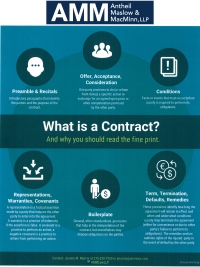This post continues my series explaining the main elements of a contract, which are outlined on the attached infographic. My goal is to demystify some of these basic provisions to help business owners have a better general understanding of what they are signing.
Another key element of a typical contract is a condition. A condition is an event that must occur or a fact that must be true before a party is obligated to perform his obligations under a contract. Conditions are used to allocate risk by making a party’s obligations, which would otherwise be absolute, dependent on circumstances that are usually outside of that party’s control. The risk of those circumstances not occurring is thus shifted to the other party. For example, your agreement to buy a parcel of real estate might be conditioned on your ability to obtain financing. If you are unable to get financing, you are not obligated to proceed with the sale. Your failure to perform your obligations is excused and is not a breach; the seller will have no claim for damages against you based on your failure to perform. A condition is not necessarily tied to a third party’s performance of an action (such as a bank agreeing to lend money to the buyer) but is sometimes linked to the performance of an obligation by the other party. Some conditions are dependent on weather or similar events that are altogether outside of the contracting parties’ and third parties’ control.
Sometimes a condition is drafted so that its non-fulfillment excuses some, but not all, of a party’s obligations under the agreement. As a result, if the condition is not met, the agreement remains in force as to all other obligations. On the other hand, a condition may be drafted so that the entire agreement will terminate if the condition is not satisfied (such as the property sale example above). It is important to note that the party benefitting from the condition may choose to waive the condition and proceed with performance under the agreement. Further, if the party whose obligations are conditioned performs those obligations even though the condition has not been satisfied, he may be deemed to have waived the condition.
Conditions are not necessarily identified in a single specific section of a contract, but often are sprinkled throughout the agreement where the parties’ obligations are identified. Because of the impact of an unsatisfied condition, it is important to be able to recognize conditions on the other party’s obligations before you enter into the agreement. Look for words such as “if”, “provided that”, “in the event that”, “subject to”, “on the condition that”, “conditioned on”, and “contingent on”.
Before you sign any contract, you should be sure to assess whether any of your obligations should be conditioned on the occurrence of facts or events. If so, it is important that those conditions be clearly identified. Similarly, you should review the agreement to identify any conditions to the other party’s obligations and their impact on the agreement overall and your rights under the agreement. Ask yourself:
• Does the agreement set out unrealistic, vague or unpredictable conditions under which the other party could be released from its contractual obligations to me? Will I have incurred unnecessary expenses prior to the determination whether the condition has been satisfied (e.g., purchase of supplies or services)?
What impact will a release of the other party’s obligations have on my business (e.g., finding a substitute vendor)?
• What actions or omissions (by me or key staff) could result in a release of the other parties’ contractual obligations?
• Are any conditions on my performance needed to provide a way out in the case of prohibitive or unacceptable changes in circumstances down the line?
In summary, contractual agreements will ultimately only yield the intended benefits to your business if they are enforceable, and that means understanding under what conditions some or all of the other party’s obligations might be excused.
Stay tuned for Part 4 of this series, which will move on to the next contract element shown on the infographic: Representations, Warranties, and Covenants.





















